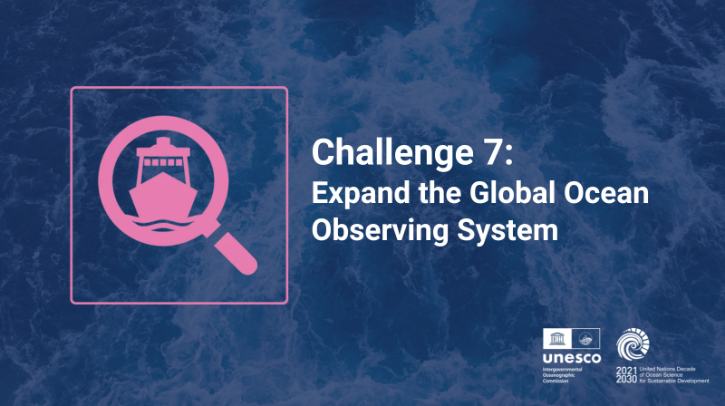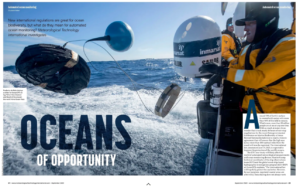The IOC/UNESCO Working Group 7 has released the UN Ocean Decade’s White Paper on Challenge 7, which looks into the sustainable expansion of the Global Ocean Observing System (GOOS) through improved data sharing, new automated technologies, artificial intelligence (AI) and machine learning (ML).
Addressing gaps requires collaboration
The white paper highlights significant gaps in the current ocean observing system. Key issues include insufficient observational coverage, especially in deep ocean and polar regions, and the need for improved data integration and sharing. The gaps also extend to technological limitations and the need for a larger, more skilled workforce to manage and utilize ocean data effectively.
According to the recommendations of the white paper, collective action in addressing these gaps should first focus on known geographical and technological gaps in the existing observing system, such as upgrading and expanding ocean observing capacity in the polar regions, the Global South, island nations and priority coastal areas. Training and capacity development are also highlighted as critical gaps at all levels of the ocean information value chain.
Coordination and co-design
The report highlighted that numerous ocean observing systems already exist in various regions of the world and better coordination among these should be facilitated by GOOS. This will ensure that standardization and the use of best practices support cost efficiency and data interoperability, while also enabling new collaborations across regions, communities and technologies.
The concept of co-design is highlighted throughout the Challenge 7 White Paper, emphasizing the importance of working together with stakeholders from the end user community as well as observation and modeling experts to evolve a responsive, solutions-oriented observing system.
Technology, sensors and platforms
According to the report, filling in the gaps in the current observing system will require strengthening and expanding the existing array of in situ and remote observing platforms, as well as developing new or enhanced automated technologies, sensors and platforms.
The White Paper for Challenge 7 together with the White Paper for Challenge 8, which aims to create a digital representation of the ocean, sets forth a strategy for the development and implementation of a fully interoperable ocean data digital ecosystem that aims to democratize data access and use for all parties, and to facilitate the use of AI and ML to provide user-ready information from integrated observations.
A new economic thinking
Significant resources are required to support the expansion of the global ocean observing system, and current investment in ocean observations and infrastructure is inadequate to support a sustainable ocean economy. New economic thinking is required to tackle this resourcing issue.
Multisector collaboration, private-public partnerships, mobilization of ocean finance tools and market incentives, as well as the establishment of new and sustained financing mechanisms for less developed regions, were highlighted as key priorities.
Addressing Challenge 7
Dr Patricia Miloslavich, program lead of the East Antarctic monitoring program of the Australian Antarctic Division and co-chair of Working Group 7, and Dr Joe O’Callaghan, director of independent science company Oceanly Science and co-chair of Working Group 7, led the group of experts who wrote and released the White Paper for Challenge 7.
The team analyzed findings and recommendations from previous papers, as well as advances the UNESCO-IOC led GOOS has made toward its 2030 Strategy. They also interviewed ocean-observing experts, stakeholders and data users, surveyed the ocean-observing needs of the UN Ocean Decade programs and projects and synthesized the ocean-observing needs of the other nine Vision 2030 Working Groups. The Challenge 7 White Paper builds upon the GOOS 2030 strategy and the Framework for Ocean Observing (FOO).
“We are excited to share the results of many months of work. The Challenge 7 White Paper has now been released, setting an ambitious vision to reinforce global ocean-observing capacity to guide our responses to climate change and other human impacts on the ocean, facilitating informed decision making for science, business and society,” Dr Miloslavich commented.
Working together
The Working Group 7 co-chairs emphasized the urgency of collaboration to grow an integrated and responsive observing system at international, regional and national levels. At the UN Ocean Decade Conference 2024 in Barcelona, Dr O’Callaghan stated, “The cost of inaction in ocean observing to human society and the blue economy is high. It’s estimated at US$200bn each year and that number will grow annually due to climate change.”
UN Ocean Decade’s challenges
Challenge 7 is one of 10 UN Ocean Decade challenges that collectively aim to stimulate ocean science and knowledge generation to reverse the decline of the state of the ocean system and catalyze new opportunities for sustainable development. It calls upon a diverse range of actors to work together to expand the GOOS to provide the information needed to mitigate and adapt to climate change and the effects of increasing CO2 levels, support ocean health and biodiversity, enable an expanding blue economy, and mitigate the risk from natural disasters. Access all 10 of the Vision 2030 White Papers here.




